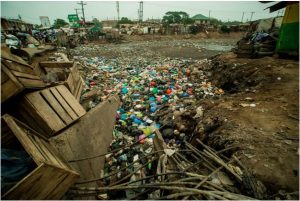DZORWULU, Greater Accra- Mariam Ahmed was once an active woman, effortlessly balancing her job and family life with the energy of someone half her age. But in February this year, the 34-year-old saw a dramatic change. Over several for weeks she complained about constant fatigue and a persistent headache that wouldn’t go away.
“We all thought it was just stress,” says Latif Mubarak, Mariam’s cousin. “After all, balancing work and raising two young children can easily wear anyone down.”
One morning, Mariam noticed a slight weakness in her right hand while pouring her tea. Over the next few hours, the weakness worsened, and she began to suspect something was wrong.
“I’ll never forget the phone call from her husband that morning,” Latif recalls. “Mariam couldn’t move the left side of her body, and her speech had become slurred.”
Latif and Mariam’s husband rushed her to a herbal clinic. After two months of herbal treatments, she began to see improvement. But they were short lived.
Two weeks after she was finally discharged from the herbal clinic, Mariam’s symptoms returned. This time her husband rushed her to hospital. After a series of tests their worst fears were confirmed: Mariam had suffered a stroke.
Strokes occur when the blood supply to the brain is interrupted, leading to a lack of oxygen vital for brain function. It is often referred to as “brain attacks” and can be life-altering in many cases robbing victims of the ability to speak or use parts of their body. In severe cases it can cause death.
Stroke is the second leading cause of death worldwide. The 2019 Global Burden of Diseases showed it was the third leading cause of disability. Ghana records between 12,000 to 16,000 cases of stroke annually.
In the past strokes primarily impacted older people. What is alarming experts now is the rising incidence of strokes among young people of 40 years and below. They make up three in ten cases in Ghana and see a higher mortality rate.
Known causes of stroke include hypertension, unhealthy diets, cigarette smoking, alcohol use and physical inactivity. But experts say there is also strong evidence that air pollution is a factor.
According to a study published the journal Neurology, in September 2023, over the short term, air pollution is thought to increase the risk of stroke by hardening arteries in the brain, making blood thicker and raising blood pressure, so boosting the risk of clots.
According to research conducted by ‘The State of Global Air’, 15 percent of stroke deaths were attributed to air pollution in Ghana in 2019. However, medical experts are of the view that there could be a surge.

“There’s air pollution everywhere. People are already suffering from airway diseases, and now stroke comes on top of that,” says Dr Freda Dodd-Glover, a neurologist at Korle-Bu Teaching Hospital. In an interview she said air pollution has emerged as a key factor in the rising number of stroke cases among younger people in Ghana, particularly in urban areas where vehicle emissions, factory waste and domestic pollution contribute to poor air quality.
Doctors gave Mariam blood thinning medication to dissolve the clot. It was a race against time – the sooner she received the treatment, the better her chances of recovery. Mariam then underwent six months of physical therapy, slowly relearning basic skills. The road to recovery was long, filled with ups and downs, but she worked hard. Though some days were disheartening, she never lost hope.
“As the weeks passed, Mariam regained most of her abilities, though the experience left its mark,” Latif says. She is still not able to speak clearly and so left the interview to Latif.
Mariam’s long recovery took a toll on her family. With two young children to care for, her husband had to take on extra responsibilities at home while also managing work. Latif says that the financial strain was immense.
“The hospital bills were high, and they had to rely on the support of extended family to get by,” he explains.
Mariam and her family have been lucky. Many more have not seen the same level of recovery. Part of the challenge in West Africa, say doctors, is the diet.
“The food choices we make here, especially our heavy consumption of starchy meals without balancing them with enough fruits and vegetables, are harmful in the long run,” said Dr Freda Dodd-Glover. “Palm oil, though traditional, is very high in saturated fat, which is dangerous for heart health.”
When air pollution is added to poor lifestyle choices it creates a perfect storm for increasing stroke cases in younger populations.
There is also a challenge in rural areas where stroke victims often lack access to medical facilities and specialists that are needed for timely interventions.
“We simply don’t have the facilities to handle severe stroke cases in rural areas,” Dr Dodd-Glover says. “Many patients don’t even make it to the hospital in time because they are not aware of the signs of a stroke.”

The World Health Organisation (WHO) has called for urgent action to tackle increasing air pollution in Ghana, particularly in the Greater Accra Region. It said steps were needed to control the menace since it mostly affected the poor and the vulnerable, particularly children and individuals suffering from air pollution-related diseases such as stroke, cardiovascular, respiratory and lung diseases.
The government has taken some steps to improve air pollution and encourage healthier diets and lifestyles. The Ghana Health Service is training healthcare providers on screening for key risk factors such as hypertension, diabetes, and obesity, which are closely linked to stroke. The Health Service provides education campaigns to increase awareness of air pollution’s risks, according to Dr Afua Commeh, Acting Programme Manager for Non-Communicable Diseases at the Ghana Health Service.
“For example, we work with various transport unions to educate them on the dangers of exhaust fumes and partner with the EPA at the community level to discourage burning rubbish and car tires,” Dr Commeh said.
But other experts would like to see the government go much further. Among the prominent critics is Dr Collins GameliHodoli, an air pollution expert, whose nonprofit Clean Air One Atmosphere has pushed the “Right to a Clean, Healthy and Sustainable Environment/Clean Air” bill in the Ghanaian parliament. The bill would give Ghanaiansthe right to clean air and legislate actions to improve public health and environmental sustainability.
Currently, the EPA’s air quality monitoring campaign is limited to Accra, with 16 stations serving a population of 2.6 million. Air quality data has been made available online and on social media for people near those sites.
Dr GameliHodoli says far more and better quality data is needed, and it needs to be made more easily available to Ghanaians so they can make decisions about their own health. It will also help government agencies tasked with cleaning the air devise better strategies.
“The approach is not suitable to help understand air quality levels in near-real-time to support public health protection and mitigation strategies due to the complexity and variability of air pollution in urban centers,” the Dr. GameliHodoli argues.
Dr Dodd-Glover would like to see the Environmental Protection Agency and the Ministry of Transport do more to curtail emissions of toxic air by factories and vehicles and encourage cleaner energy sources.
“But we don’t have the infrastructure yet, and electric vehicles are too expensive for most Ghanaians,” she said.
She would like to see more health campaigns. “It would help if TV and radio stations dedicated more airtime to educating the public about stroke prevention. The government can do more by setting up information campaigns and making stroke education a priority. Communities also have a role to play by reducing pollution at the local level.”
For now doctors are left with few choices to advise patients with stroke and other air pollution related illnesses. Dr Commeh recommends those who can to move. “As people move closer to the mountains, where there are more trees, the environment is cleaner, and the quality of air is much better,” she said.
For those unable to relocate, she recommends practical measures such as ventilating homes and planting trees to help improve local air quality. In extreme cases, she suggested wearing masks to minimize exposure to polluted air.
While Mariam has regained most of her physical abilities, doctors advise her to continue monitoring her health closely and to maintain her healthier lifestyle choices to reduce the risk of another stroke.Mariam has made major lifestyle changes. She has switched to a healthier diet which includes more fruits and vegetables, and fewer starchy foods.
The whole family says they are now more conscious of her exposure to air pollution. They follow all advice and wear nose masks everywhere they go. And they’re telling anyone who will listen how to protect themselves from the major health dangers of air pollution.
This story is a collaboration with New Narratives. Funding came from the Clean Air Fund which had no say in the story’s content.









